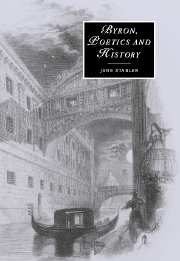Book contents
- Frontmatter
- Contents
- Acknowledgements
- Note on texts
- Abbreviations
- Introduction: Byron and the poetics of digression
- 1 ‘Scorching and drenching’: discourses of digression among Byron's readers
- 2 ‘Breaches in transition’: eighteenth-century digressions and Byron's early verse
- 3 Erring with Pope: Hints from Horace and the trouble with decency
- 4 Uncertain blisses: Don Juan, digressive intertextuality and the risks of reception
- 5 ‘The worst of sinning’: Don Juan, moral England and feminine caprice
- 6 ‘Between carelessness and trouble’: Byron's last digressions
- Notes
- Bibliography
- Index
1 - ‘Scorching and drenching’: discourses of digression among Byron's readers
Published online by Cambridge University Press: 22 September 2009
- Frontmatter
- Contents
- Acknowledgements
- Note on texts
- Abbreviations
- Introduction: Byron and the poetics of digression
- 1 ‘Scorching and drenching’: discourses of digression among Byron's readers
- 2 ‘Breaches in transition’: eighteenth-century digressions and Byron's early verse
- 3 Erring with Pope: Hints from Horace and the trouble with decency
- 4 Uncertain blisses: Don Juan, digressive intertextuality and the risks of reception
- 5 ‘The worst of sinning’: Don Juan, moral England and feminine caprice
- 6 ‘Between carelessness and trouble’: Byron's last digressions
- Notes
- Bibliography
- Index
Summary
Max Beerbohm's picture of ‘Lord Byron, shaking the dust of England from his shoes’ (1904) captures the exquisitely self-conscious turn away from the English public Byron was seen to have made in April 1816. That moment of departure also signalled a turning-point in his reputation – or so the familiar outline of his career has led us to believe. The separation scandal is usually presented as the definitive break between Byron, London society and the adulation of his English readership. There is strong evidence, however, to suggest that Byron's readers were already alert to and unsettled by this kind of behaviour, not least because his poetics of rapid transition, modulation and subversive aside raised awkward questions from the start of his career. Critical expressions of unease offer us a reader-centred view of digressive poetics and a fresh way of approaching the unique texture of Byron's verse.
Scholars of Byron's and other Romantic poets' receptions in England have, of course, noted that his work was always controversial. But they have not analysed the peculiar kinds of misgiving expressed about Byron's poetry, nor have they traced the evolving significance of this kind of critical discourse. The extensive reviews of Byron's publications during his lifetime are evidence that, for his contemporaries, digression covered a multitude of sins including misanthropic or political perversion, contradictory principles, sudden changes of tone, and personal or cultural allusions in a variety of shapes and forms.
- Type
- Chapter
- Information
- Byron, Poetics and History , pp. 18 - 42Publisher: Cambridge University PressPrint publication year: 2002



